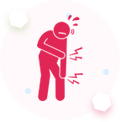Kidney Stones

Kidney stones, also called renal calculi, are solid concretions (crystal aggregations) of dissolved minerals in urine; calculi typically form inside the kidneys or bladder.
Kidney stones or renal calculi or nephrolithiasis is a condition where there are hard deposits of minerals and salts in the renal tract. A kidney stone is a hard, crystalline mineral formed within the kidney or urinary tract. Kidney stones have many causes and can affect any part of the urinary tract from the kidneys to your bladder. The stones form when the urine becomes concentrated, allowing minerals to crystallize and cloud together.
Formation of stones at any location in the urinary tract is referred to as urolithiasis, and the term ureterolithiasis is used to refer to stones located in the ureters. These stones are made of different types of materials, and their further treatment depends on its type. Almost 80% of stones are calcium grains and 5-10% stones are Uric acid stones. Kidney stones strike more men than women.
The main reason for developing kidney stones are as follows-
- Drinking less amount of water.
- Having a diet that is rich in protein, sodium, and sugar.
- Having a family history of kidney stones.
- You are suffering from overweight.
- Suffering from inflammatory bowel diseases.
- Deposit of a high amount of calcium and other minerals in your kidney.
- You have suffered from kidney stones previously.
- Consumption of certain medicines can cause kidney stones.
- Suffering from polycystic kidney diseases.
Homoeopathy Treatment For Kidney Stones
Homeopathic remedies can offer complete cure for renal stones except in Struvite stones, when the stone size is large or the stone is impacted, or there are multiple stones. There are number of best medicines in homeopathy for renal calculi. Choice of medicine in homeopathy is based on totality of symptoms. Homeopathy is a very safe and an effective bet in avoiding surgery by removing and preventing renal calculi from recurring again. Homeopathic remedies will give symptomatic relief to the patient, and when the stone size is small it will crush or break the stone, dissolve the stone gradually by acting on its chemical composition, will help push forward the stone in the urinary tract. Homeopathy still has a role to play in preventing its recurrence and in treating secondary infections of the urinary tract arising after injury from the moving stone







